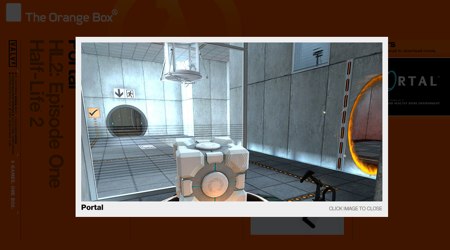Game Of The Decade 2
Stacey Mason

Tom Chatfield, senior editor of Prospect Magazine answers our Game of the Decade call with a thoughtful approach to one of the most delightfully witty puzzle games ever created:
Valve Corporation's 2007 first-person action/puzzle masterpiece Portal is, for me, one of the defining games of the last decade. Released as a kind of bonus within the Half-Life 2 "Orange Box" set, it's wonderful partly because of its resolutely old-fashioned virtues, being a self-contained, single-player piece of inspiration that takes a single concept and spins it out through twenty exquisitely designed levels. But it's also wonderful because of another, rare gift: its tone, and the fact that few games have ever conjured a more distinctive, delightful or deranged miniature universe.
For those who've been living in a cave for the last few years, the game is driven by the wonders of the portal gun: a bulbous piece of kit that allows you to open a passageway between any two amenable surfaces. Shoot the blue end at a distant wall, shoot the other, orange end underneath your feet, and your character will drop through the orange hole and pop out of the blue, your momentum miraculously conserved. You can shoot as you're hurtling through the air to stack up a whole chain of these transitions - and to solve increasingly devious spatial problems, involving lava pits, killer robots and a curiously endearing companion cube. Or, of course, you can just hurtle around enjoying the stunts it's possible to pull off with a portable teleportation device. Like the low-gravity antics of the Ziggurat Vertigo level in Quake, few sensations beat the thrill of swooping across the planes of a virtual arena, and there's a joy to using the gun that taps into games' ability to be at once viscerally satisfying and absorbingly abstracted.
Portal is justly celebrated for the genius of this central mechanic. The emergent complexities that it's possible to develop from a really well-executed physics engine have long been one of the jewels in the game designer's crown, and few have achieved a finer combination of ingenuity and intuitive ease than Valve. To understand just why the game deserves its iconic status, however, it's useful to contrast Portal to its lesser-known predecessor, Narbacular Drop. This was the 2005 PC game that pioneered the notion of the "portal" itself, and whose development team were subsequently hired wholesale by Valve. Narbacular Drop is a brilliant, brief student showcase. But it's not in the same league as its sequel. And this is, really, a question of artistic as much as intellectual achievement.
The key is a machine called GLaDos who, in a series of increasingly deranged audio messages, drives forward a plot that is as finely-made as the spatial puzzles of the levels themselves. Your character is trapped in a subterranean scientific testing facility, and GLaDos is there to motivate you with a bizarre mixture of threats, promises, lies and increasingly hard-to-credit offers of cake. Until, in the end, you get to escape, wind your way through the industrial back-end of the facility, and kill your monstrous tormentor. Who then sings, over the credits, one of the catchiest songs of the gaming era. It's a combined triumph of writing, voice-acting and attention to detail that has lifted hearts and engendered adulation across the world. Although- and I hate to break this to those who have been living in hope - the cake is a lie.
Chatfield’s newest book Fun Inc.: Why Play is the 21st Century’s Most Serious Business is now available.
